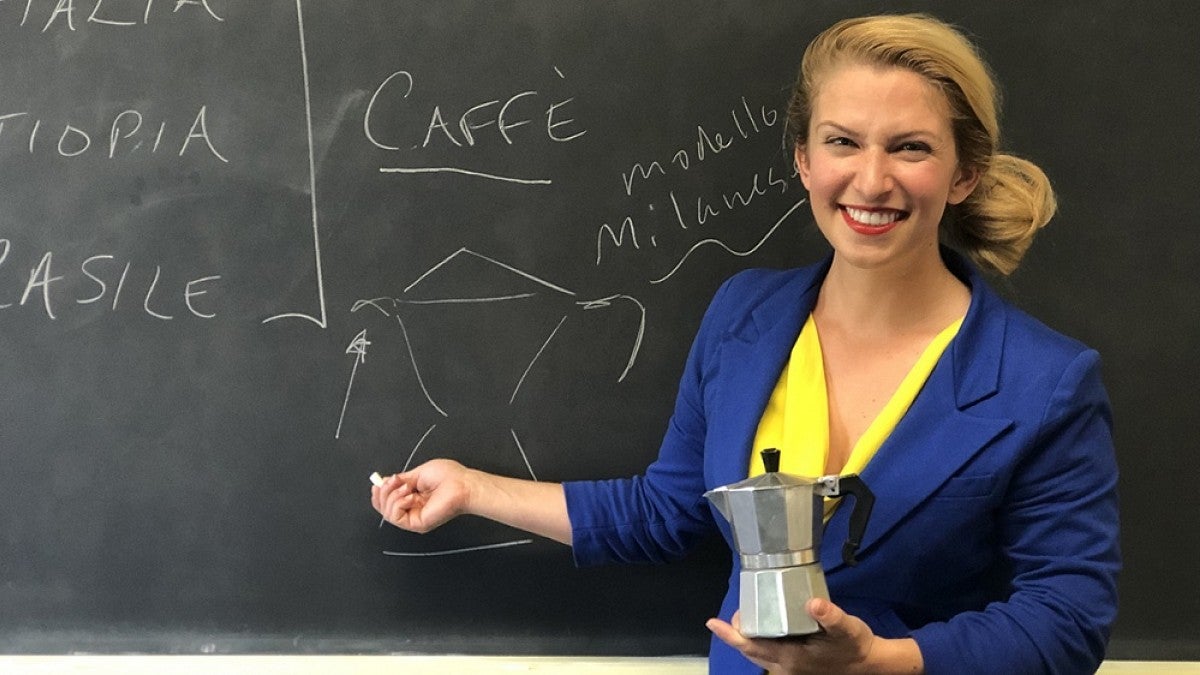UO President Michael Schill has announced a second round of funding for Language Learning Innovation for Teaching, a program designed to catalyze innovation in language teaching and learning.
New curricula developed through the program, known as LIFT, will bolster participation in second-language learning and teaching, provide multiple paths to proficiency and inspire students to persist in language study. The funding is part of the president’s ongoing commitment to the importance and advancement of the humanities at the UO.
Schill made an initial $100,000 investment in LIFT in 2018-19, supported by an additional $30,000 from the College of Arts and Sciences dean. The president is building on that to commit an additional $10,000 in 2019-20, to be supplemented by $80,000 from the dean.
The initial funding has resulted in the development of a first wave of pioneering language courses, some of which have already been launched in the classroom, reaching nearly 300 students; others will be taught during 2019-20 academic year.
All of the pilot courses explore different approaches to language study, many of them through the lens of cultural topics such as Mediterranean cuisine, the expression of sexuality in German literature and film, and the history of expatriate African American writers in Paris.
Other courses present new options for language study through methodologic approaches such as translation of Spanish flash fiction, poems and letters; linguistic analysis of Japanese films, literature, advertisements and comics; and a 100-level linguistics course that takes a step back from specific languages and teaches students the basic principles of learning any language.
“Our aim is to redesign UO programs to provide the best, most innovative university-level language learning experience in the Pacific Northwest,” said Karen Ford, senior divisional dean for humanities, “and, eventually, a national model.”
Part of the LIFT strategy has been to inspire tenure-track faculty members to propose innovative courses that would involve them more directly in teaching lower-division undergraduates. In its first complete year, 10 lower-division, LIFT-funded courses were taught by senior faculty members.
“This is a significant increase in the number of TTF faculty actively involved in lower-division language education at the UO,” Ford said.
LIFT capitalizes on a rare set of resources that make the UO an ideal campus for incubating breakthroughs in language teaching: the UO is home to the teaching and learning of 22 languages; experts in second-language learning and teaching; the Center for Applied Second Language Studies, one of 16 national foreign language resource centers in the country; and the technology and facilities of the Yamada Language Center.
In the first year of LIFT funding, 14 proposals for course innovation were selected, seven of which were implemented this year, including:
- German 251: Sexuality — Taught for the first time in fall 2018, this course traces the dynamics of sexuality through the cultural and political landscape of modernity and examines pioneering and provocative works from 19th- to 21st-century German artists and scientists to understand how sexual norms are constructed over time and how people resist them. Interactive, customized activities are designed to jump-start students’ linguistic comprehension of basic German expressions and make non-German speakers aware of the inseparable relation between culture and language.
- Italian 399: La Cultura Culinaria —Taught for the first time in winter 2019, this course treats cuisine as an art form on par with music or painting and, accordingly, a worthy vehicle for language study. Students read traditional Italian literature such as Dante’s “Circle of the Gluttons” and also study paintings like Caravaggio’s fruit basket and operas from Verdi and Puccini, as well as recipes from famous cookbooks of the time period, to understand food writing as a type of literature. As final projects, students conducted a cooking show, preparing 19th- and 20th-century Italian recipes.
- Japanese 199: Language, Representation and Identity — This course combines both language and literature study, focusing on the ways language serves to express thoughts, intentions, desires and identity. Exploring four media genres — films/dramas, literature, advertisement and comics — students learn how language is used to evoke images and send implicit messages, and how this may be similar or different across cultures. This course will be taught for the first time in academic year 2019-20; Japanese 103 will be a prerequisite.
- Comparative Literature 213: African American Artists and Writers in France — Piloted as a Clark Honors Collegecolloquium, this course will be offered as a general education course this fall. It focuses on the vibrant African American community that emerged in France after World War II, including writers such as Langston Hughes, Richard Wright and James Baldwin. Each writer chose to include passages in French in their writing; students will translate passages together and discuss reasons for the authors’ choice of incorporating French terms, idioms or entire dialogues into their English texts.
In addition to a second round of funding commitment to LIFT, Schill also recently funded a new set of fellowships to support UO faculty members in the arts and humanities in their research or creative projects.
“Our faculty in the humanities play a key role in making the UO a top academic and research university,” Schill said. “I am excited by the opportunity to support their scholarly and creative endeavors.”
—By Lisa Raleigh, College of Arts and Sciences


